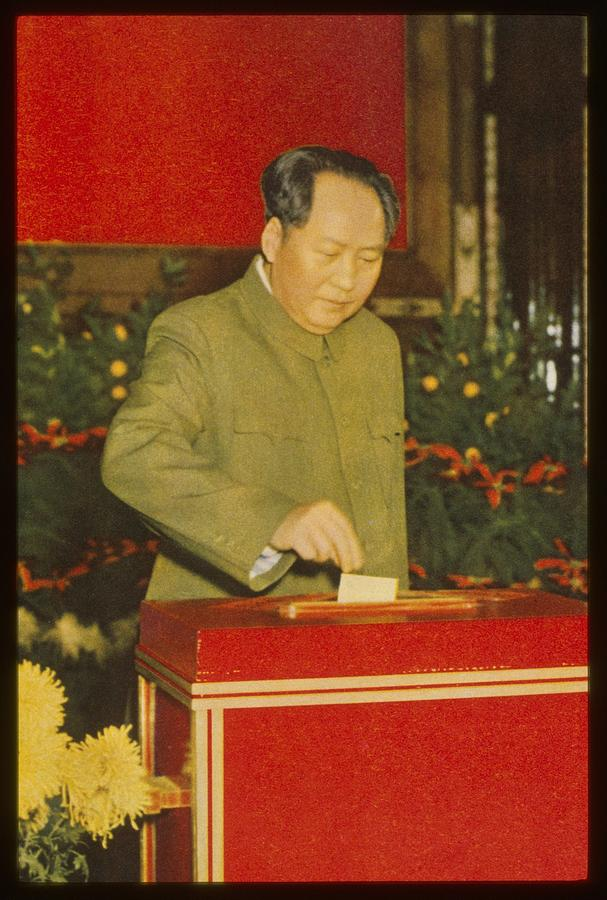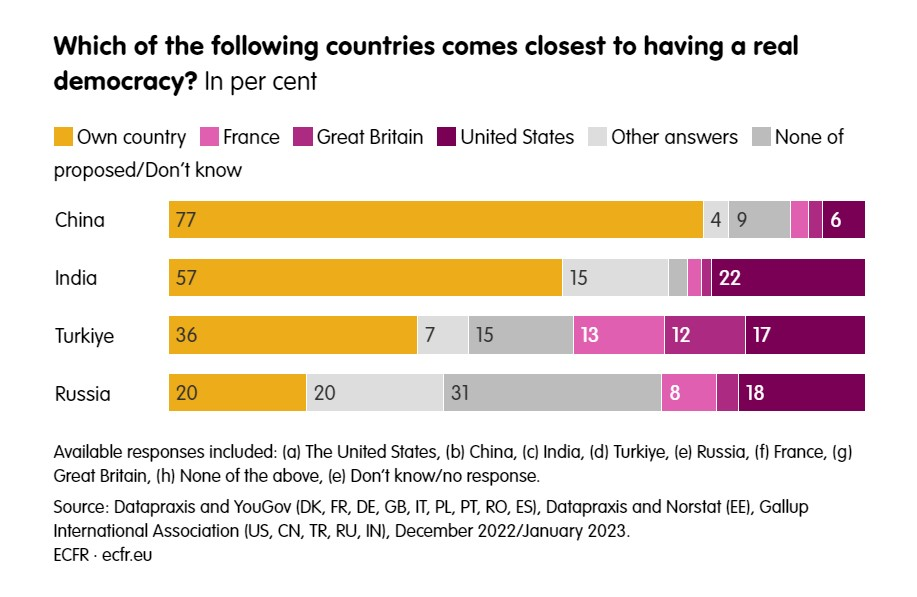More languages
More actions
(→Bourgeois democracy: added about the Deng quote) Tag: Visual edit |
(lenin quote, ending of article) Tag: Visual edit |
||
| Line 9: | Line 9: | ||
== Bourgeois democracy == | == Bourgeois democracy == | ||
[[File:Democracy poll.png|thumb|A majority of [[People's Republic of China|Chinese]] and [[Republic of India|Indian]] people believe their countries are more democratic than the [[Imperial core|West]] in addition to a large minority from [[Republic of Turkey|Turkey]] and [[Russian Federation|Russia]].]] | [[File:Democracy poll.png|thumb|A majority of [[People's Republic of China|Chinese]] and [[Republic of India|Indian]] people believe their countries are more democratic than the [[Imperial core|West]] in addition to a large minority from [[Republic of Turkey|Turkey]] and [[Russian Federation|Russia]].]] | ||
In practice, bourgeois democracies are a form of the [[dictatorship of the bourgeoisie]]. Capitalists and [[Landlord|landlords]] control 90% of newspapers and meeting halls and prevent workers from controlling the state through [[Private property|bourgeois property]] laws.<ref>{{Citation|author=[[Vladimir Lenin]]|year=1918|title=“Democracy” and Dictatorship|mia=https://www.marxists.org/archive/lenin/works/1918/dec/23.htm}}</ref> | In practice, bourgeois democracies, or capitalist democracies, are a form of the [[dictatorship of the bourgeoisie]]. Capitalists and [[Landlord|landlords]] control 90% of newspapers and meeting halls and prevent workers from controlling the state through [[Private property|bourgeois property]] laws.<ref>{{Citation|author=[[Vladimir Lenin]]|year=1918|title=“Democracy” and Dictatorship|mia=https://www.marxists.org/archive/lenin/works/1918/dec/23.htm}}</ref> | ||
[[Deng Xiaoping]] argued that bourgeois democracy was, | [[Deng Xiaoping]] argued that bourgeois democracy was, | ||
| Line 16: | Line 16: | ||
He argued that rather than having a bourgeois democracy in China, there was a people's democracy.<ref>{{Citation|author=Xi Jinping|year=2022|title=The Governance of China|chapter-url=https://en.qstheory.cn/2023-07/21/c_904217.htm|section=Whole-Process People's Democracy: The Most Extensive, Genuine and Effective Socialist Democracy|city=Beijing|publisher=Foreign Language Press Co. Ltd|isbn=978-7-119-13094-1|volume=IV|trans-title=习近平谈治国理政}}</ref> | He argued that rather than having a bourgeois democracy in China, there was a people's democracy.<ref>{{Citation|author=Xi Jinping|year=2022|title=The Governance of China|chapter-url=https://en.qstheory.cn/2023-07/21/c_904217.htm|section=Whole-Process People's Democracy: The Most Extensive, Genuine and Effective Socialist Democracy|city=Beijing|publisher=Foreign Language Press Co. Ltd|isbn=978-7-119-13094-1|volume=IV|trans-title=习近平谈治国理政}}</ref> | ||
Lenin in Chapter 5 of [[Library:The state and revolution|State and Revolution]] declares, | |||
Democracy for an insignificant minority, democracy for the rich--that is the democracy of capitalist society. If we look more closely into the machinery of capitalist democracy, we see everywhere, in the “petty”--supposedly petty--details of the suffrage (residential qualifications, exclusion of women, etc.), in the technique of the representative institutions, in the actual obstacles to the right of assembly (public buildings are not for “paupers”!), in the purely capitalist organization of the daily press, etc., etc.,--we see restriction after restriction upon democracy. These restrictions, exceptions, exclusions, obstacles for the poor seem slight, especially in the eyes of one who has never known want himself and has never been in close contact with the oppressed classes in their mass life (and nine out of 10, if not 99 out of 100, bourgeois publicists and politicians come under this category); but in their sum total these restrictions exclude and squeeze out the poor from politics, from active participation in democracy. | |||
This minority rule of the tiny unelected group, the capitalist class in politics mirrors the daily work life of workers throughout the world. Why is the workplace decisions of what to produce, where to produce and how to produce are left to the undemocratic and short-sighted profit-seeking of capitalists? The individual enterprise is the smallest cell of capitalist democracies. With capitalists organizing together along class lines to run the political system made up of all these workplaces. Democracy for the 1%. | |||
== See also == | == See also == | ||
Revision as of 23:27, 15 August 2023

Democracy, as of common consensus, as a concept, was formally conceived by the ancient Greeks. The word “democracy” comes from two Greek words being: people (demos), and rule (kratos). By popular definition, democracy is a method of rule wherein the populace have common power, as in the people have an active role within the steering and guidance of the state. Contrary to common conception, “democracy” is not a system within itself, but a basis upon which political organizations and structures are formed. Democracy became the method of rule within Athens, a part of the superstructure, so to speak, however within the bounds of the material base. In slave societies, the only people eligible to participate were so-called “free men”, which did not include women, children, and slaves, who made up the majority of the population.
Freedom in capitalist society always remains about the same as it was in ancient Greek republics: Freedom for slave owners.
Interpretations
Democracy in modernity has been split into many categories and has been countlessly interpreted and, at times, vulgarized by bourgeois thinkers. It may be noted that “democracy”, in all of its forms, are indeed a progressive force comparatively to the political systems proceeding it. Even the simplest liberal democracy serving the interests of the ruling class, is still superior to a direct dictatorship by class interests.
Bourgeois democracy

In practice, bourgeois democracies, or capitalist democracies, are a form of the dictatorship of the bourgeoisie. Capitalists and landlords control 90% of newspapers and meeting halls and prevent workers from controlling the state through bourgeois property laws.[1]
Deng Xiaoping argued that bourgeois democracy was,
'...no more than a system of multiparty elections, separation of judicial, executive and legislative powers, and a bicameral legislature.'
He argued that rather than having a bourgeois democracy in China, there was a people's democracy.[2]
Lenin in Chapter 5 of State and Revolution declares,
Democracy for an insignificant minority, democracy for the rich--that is the democracy of capitalist society. If we look more closely into the machinery of capitalist democracy, we see everywhere, in the “petty”--supposedly petty--details of the suffrage (residential qualifications, exclusion of women, etc.), in the technique of the representative institutions, in the actual obstacles to the right of assembly (public buildings are not for “paupers”!), in the purely capitalist organization of the daily press, etc., etc.,--we see restriction after restriction upon democracy. These restrictions, exceptions, exclusions, obstacles for the poor seem slight, especially in the eyes of one who has never known want himself and has never been in close contact with the oppressed classes in their mass life (and nine out of 10, if not 99 out of 100, bourgeois publicists and politicians come under this category); but in their sum total these restrictions exclude and squeeze out the poor from politics, from active participation in democracy.
This minority rule of the tiny unelected group, the capitalist class in politics mirrors the daily work life of workers throughout the world. Why is the workplace decisions of what to produce, where to produce and how to produce are left to the undemocratic and short-sighted profit-seeking of capitalists? The individual enterprise is the smallest cell of capitalist democracies. With capitalists organizing together along class lines to run the political system made up of all these workplaces. Democracy for the 1%.
See also
References
- ↑ Vladimir Lenin (1918). “Democracy” and Dictatorship. [MIA]
- ↑ Xi Jinping (2022). The Governance of China, vol. IV (习近平谈治国理政). Beijing: Foreign Language Press Co. Ltd. ISBN 978-7-119-13094-1
